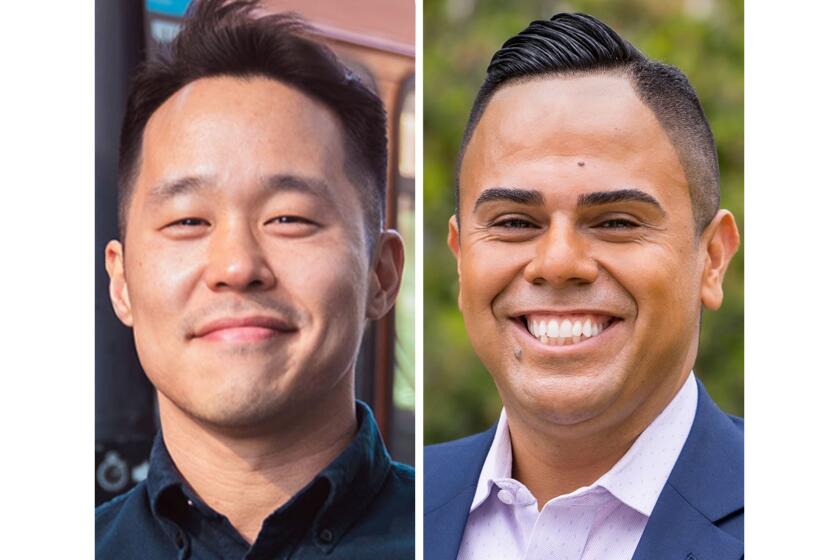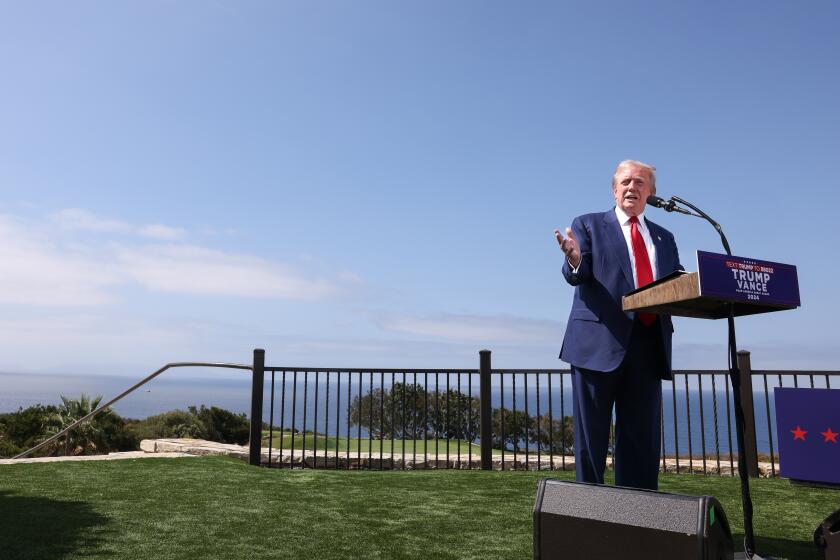Kerry in Ohio: Hard Edge and Soft Touch
Sen. John F. Kerry on Sunday intensified his charge that President Bush misled the country into war with Iraq, while the Democrat also sought to empathize with the struggles of working people during a campaign swing through Ohio.
Kerry seized on a New York Times report that while Vice President Dick Cheney and national security advisor Condoleezza Rice repeatedly asserted before the U.S. invasion that Iraq was planning to use a cache of aluminum tubes to develop centrifuges to enrich uranium, some top U.S. nuclear experts believed they were actually intended for small artillery rockets.
No evidence of a nuclear program has been found in Iraq.
During a campaign visit to Austintown, Ohio, a suburb of Youngstown, Kerry suggested that Bush had not been forthright about the need to go to war.
Declaring that the public needs assurance “that the president is being straight with them,” Kerry said the article raised “serious questions about whether or not the administration was open and honest in making the case for the war in Iraq.”
“These are questions that the president must face,” he added, speaking to hundreds of supporters at a town hall meeting in the gym of Austintown Fitch High School. “These are the questions that the president has to answer fully to the American people and to the troops.”
In a conference call organized by the Kerry campaign, Sen. Bob Graham (D-Fla.) went further, singling out Bush as “the perpetrator of those lies.”
“It is an outrage ... and is not only a statement about the intelligence of this administration, but the fundamental character of this administration, that they would so mislead citizens of the United States and the world,” said Graham, a former chairman of the Senate Intelligence Committee.
Rice defended the White House on Sunday and said the administration stood by its decision to go to war against Iraq.
“If you underestimate the nuclear threat of a tyrant, you make a really big mistake,” she said on CNN’s “Late Edition.” Rice said she was aware of the debate over whether the tubes were intended for a nuclear weapons program.
But, she added, “the fact of the matter is, the president made this decision based on a body of evidence, not just on aluminum tubes, and on the key judgment of his intelligence organization that this was a program of reconstitution of the nuclear program.”
But the Massachusetts senator sought to use the New York Times report to advance his argument that Bush misled the country, extending that charge to matters beyond the war in Iraq.
“I think all too often the administration also chooses to avoid the facts and the truth ... not just in the issues about how we went to war, the intelligence, what intelligence we had or didn’t have,” Kerry said in Austintown. “Just look around you in the economy of our country.”
Kerry noted that Ohio has lost more than 230,000 jobs under Bush, a fact the president did not highlight during his visit to the state Saturday.
“The question is,” Kerry said, “does he really see and know what is going on in the lives of middle-class Americans, people struggling to get into the middle class, people who are fighting for survival?”
Bush campaign spokesman Steve Schmidt dismissed Kerry’s pledges to improve the economy and stop the flow of jobs overseas.
“His plans for higher taxes and new spending will halt our economic growth and destroy jobs,” Schmidt said in a statement.
But during Kerry’s daylong swing through Ohio -- his 17th trip to the state since virtually securing the Democratic nomination in March -- he repeatedly cast his rival as indifferent to the pressures facing average Americans and portrayed himself as the champion of their needs.
In Niles, the senator visited steelworkers on a picket line outside an RMI Titanium plant, which locked out 361 workers over a wage dispute nearly a year ago.
The candidate asked them about how the lockout has affected their lives.
“You have to change your entire way of life, basically,” Michael Mignogna, 55, a 24-year plant veteran, told him. “You’re always worrying about where that next dollar’s going to come [from] just to survive, to buy the groceries.”
Kerry said his healthcare plan would bring down the cost of benefits for employers and help resolve similar labor disputes. “This president hasn’t even been trying,” he said. “He sure doesn’t seem to be affected by it.”
Later, steelworker Ray Raschilla Jr. told the town hall audience in Austintown that he could not afford health insurance because of the lockout. But he said the most difficult moment occurred a few weeks ago when he could not buy his 15-year-old daughter a dress for her school’s homecoming dance.
“There’s no money coming in and nowhere to go,” Raschilla said.
After embracing him, Kerry pledged to make life easier for working people, scolding the administration in the process.
“People like Ray can’t get insurance and can’t get unemployment extended, but these people are down there fighting with everything they’ve got to give the wealthiest people in the country a permanent tax break?” Kerry asked incredulously. “Not in my America.”
In a later stop in Cleveland, Kerry campaigned with the Rev. Jesse Jackson, a new advisor, making an appeal to African American voters gathered for an evening rally at East Mt. Zion Baptist Church.
“I understand what’s happening to the middle class of this country and people struggling to get into it,” Kerry said. “America, Ohio, Cleveland -- you elect me president of the United States, and I’ve got your back.”
Times staff writer Richard Simon in Washington contributed to this report.
More to Read
Get the L.A. Times Politics newsletter
Deeply reported insights into legislation, politics and policy from Sacramento, Washington and beyond. In your inbox three times per week.
You may occasionally receive promotional content from the Los Angeles Times.










